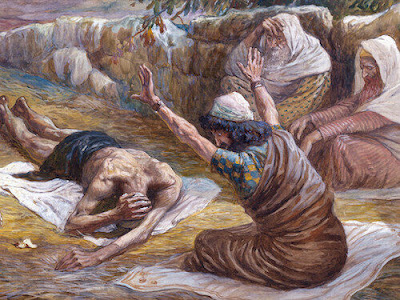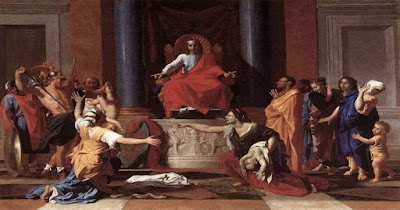Fifth Ordinary Sunday, Year B
Theme: Father! Deliver Us From Evil 父啊!救我們免於凶惡
Today in the first reading, we hear of Job’s lamentaion. He spoke for all the good and the innocent who suffered for no apparent purposes. Had the story of Job had not a happy ending, his story would have been a total tragedy offering no hope in the Bible. Still it is a challenge for all Christians to defend the omnipotence of God together with His righteousness and mercy. Since ancient times, people have been criticizing the idea of an almighty and righteous Christian God who loves and cares for humanity. If this God were loving and caring, He would not have allowed the good and innocent to suffer. If this God were loving but were not able to deliver the good and innocent from sufferings, He would not be omnipotent! If He were all powerful but still allowed the good and innocent to suffer, not to mention the wicked had always been prosperous and healthy, this Christian God would not be fair and righteous! In short, Job’s story forces us to meditate on the mystery of sufferings, especially the sufferings of the good and innocent.
Some Christians put together passages from the Bible to prove that after all the good and innocent are not good and innocent as they appear to be. St. Paul says, “All have sinned and are deprived of the glory of God” (Romans 3:23). Therefore, goodness and innocence of people are actually superficial. They can only fool the eyes of human beings but not God’s. Moreover, God says, “You shall not bow down before them or serve them. For I, the Lord, your God, am a jealous God, bringing punishment for their parents’ wickness on the children of those who hate me, down to the third and fourth generation” (Deuteronomy 5:9). Who in his right mind would “hate” God? In the context of this piece of proof-text, the word “hate” means “love less” because the Hebrew language does not have comparative syntax. The text is a warning against idolatry. God will punish down to the third and fourth generation those people who love idols more than Him. Alas! Humanity loves making different sorts of idols such as power, wealth, knowledge and even health, to secure their livelihood! Therefore, sufferings are God’s punishments for your sins or sins of your ancestors etc. This argument is extremely weak and is refuted by Jesus when He cured the man born blind. Jesus says, “Neither he nor his parents sinned; it is so that the works of God might be made visible through him” (John 9:3). Jesus is Christ and His words do not apply to this blind man only but are applicable universally. In fact, prophets in the Old Testament also refute the view that children should suffer for the sins of their parents (Ezekiel 18:20-21). Though it is not easy to pin down exactly what Jesus means by “the works of God might be made visible through him [the born blind]”, the argument that sufferings are God’s punishments has been proven wrong by the Son of God!

Some Christians console themselves to argue that sufferings make us “wounded-healers” so that in the future, we may be more capable of helping those who undergo similar sufferings because we have gone through the pains and survived. Just as what St. Paul says in the second reading today, “To the weak I became weak, to win over the weak. I have become all things to all, to save at least some” (1 Corinthians 9:22). Indeed the Son of God did not save humanity in an aloft manner from heavens above, but took flesh to become man; lived among us to undergo human sufferings. “For we do not have a high priest who is unable to sympathize with our weaknesses, but one who has similarly been tested in every way, yet without sin” (Hebrews 4:15). This argument is reasonable as long as the wounded-healers do not fall into the trap of thinking themselves Saviours. Healing comes from God, not from us. Even genuine faith-healers/exorcists are merely channels of God’s grace. However, this argument still fails when the wounded-healer dies and does not have the opportunity to heal others!
Lastly, some Christians suggest that we should not be myopic but should look from God’s long-term perspective. God has a grand plan. Be patient and let God’s plan unfold. Then we’ll understand. This argument brings to mind the famous aphorism of Tertullian “The blood of the martyrs is the seed of the Church” (Apologeticus, L.13). In the spirit of the Parable of the Sower, sufferings of the good and the innocent are truly seeds of gospel messages which will touch the hearts of some people and the torch of God’s gospel will pass on! Though efficiency might not be high, as long as more of us generously respond to God’s call to become labourers, we are optimistic that the harvest will be abundant (Matthew 9:37b-38; Luke 10:2). Alas! We have been meditating God’s grand plan for two millenia but who has successfully scratched the surface of God’s grand plan? This seed metaphor has missed one crucial point. What makes the blood the seed? The Passion and Resurrection of Jesus Christ does! The Son of God is the True Pascal Lamb who takes away the sins of the world by bearing the brunt of all human evils. He retains the wounds after Resurrection to remind His followers that evils really hurt. St. Paul says, “Now I rejoice in my sufferings for your sake, and in my flesh I am filling up what is lacking in the afflictions of Christ on behalf of his body, which is the Church” (Colossians 1:24). St. Paul does not promise his readers a better tomorrow. Instead, he gives sufferings a new purpose, namely to take part in Christ’s effort to build the Kingdom of Heaven on earth!
What impresses me most in the gospel story today are the exorcisms. Though the exorcisms were mentioned in general terms (Mark 1:32, 34), together with the one mentioned in details on last Sunday, there are altogether three mentions in the first chapter of Mark. In New Testament times, Jews attributed sickness to either God’s punishment or demonic possession. Demonic possession was permitted by God as a punishment as well. Therefore, the sick bore all the blames and could not expect sympathy from fellow Jews. Following this logic, lepers and the possessed were typical sinners! Nowadays, thanks to Jesus’ exhortation on the Last Judgment, “Ill and you cared for me” (Matthew 25:36b), modern people treat the sick more humanely. Of course, there is still room for improvement because not all the sick are treated equally. Some are more equal than the others. Today, there are still many things we are ignorant about some illnesses, in particular mental illnesses. Ignorance breeds fears and prejudices. Therefore, mental patients do not receive the dignity due them. Even worse, totalitarian states lock up dissidents not only in correctional institutions but also mental institutions! I am concerned because the good and the innocent will easily fall prey to such injustice and sufferings.
Alas beloved brethren! Life is really a complex phenomenon. The case of totalitarianism points to the fact that it is unfair to put all the blame on God. Humanity has a share of blame to bear. Take a look at the global climate crisis today. The faults of some people make the rest victims. It follows that we should take up the responsibility to clean up the mess we create. In short, not only does Jesus heal, but we Christians are also sent out to heal the world as channels of the Father’s grace.
Heavenly Father! Deliver us from evil. Amen.
2021 Reflection
Picture Credit: valleyofsprings.com





















